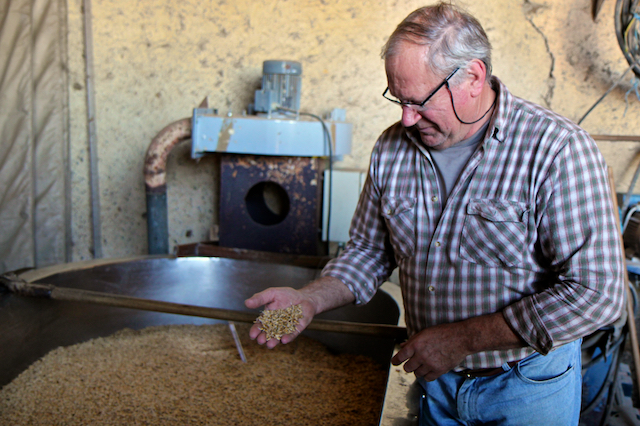Belgian Style Beer in the Southwest of France
As you make your way south through Gascony towards the Spanish border, you eventually reach the French department of the Hautes-Pyrénées—a description that becomes obvious once you begin to make out the Pyrenee mountain tops in the distance. In terms of wine, this is Madiran country. The vineyards are planted with tannat, a heavily tannic grape that extends a bit beyond the definition of robust. But we weren’t in search of Madiran wine today. We were on the hunt for beer. On a slope over looking the snowy caps of the Pyrenne peaks sits the home of Pierre Lebbe, his small farm of goats, and a tiny brewery called Brasserie Lebbe—one of the many secrets of the Sud Ouest.
This is Pierre. He’s sifting through a tank of his organically-grown barley, all 100% farmed from his own fields nearby. In order to keep his organic designation, Pierre imports organically-grown hops from Germany to complete the malting process. Using the right materials with such a light and delicate beverage is everything. When combined with mountain spring water from the nearby Pyrenees, the resulting beer is something quite magical. Those simple ingredients are combined to create a farmhouse ale of supreme grace. In fact, the beer is so light and refreshing that you’ll continuously look down at your glass and find that it’s empty. At least that’s what happened to me.
A farmhouse ale is a type of saison beer, typically associated with Belgium, that has recently become quite popular again in the U.S. While the term farmhouse now refers to the style of beer, in the case of Brasserie Lebbe it's more of a literal definition. The beer is indeed brewed on a goat farm where Pierre and his wife also make some very fine cheeses. Le fromage au lait de chévre happens to be one of the great food pairings with saison beer, the fruity, mildly yeasty flavors complimenting the tart and earthy flavors of the cheese. How convenient for Pierre.
If you're wondering how a Frenchman living near the Pyrenees began making Belgian style beer in the middle of Madiran country, it's quite simple. Pierre was born to English and Belgian parents who were quite fond of the stuff. When Pierre began his goat cheese business along with the help of his wife, his hankering for the nostalgic days of fresh and airy saisons become too strong to deny—especially with nothing to drink locally other than heavily-tannic red wine and fiery Armagnac brandy. Necessity is the mother of invention, however. Desire and reminiscence are powerful motivators.
And so we drank beer. Pierre poured us a few glasses and they were gone in under a minute. Then he put out a plate of various goat cheeses and we ate them in seconds. Then he poured us more beer. Then more cheese. Then more beer. And then more cheese. "Don't worry," he told us as we gorged, "Goat cheese is lower in fat so it's easier to digest." That was a good enough excuse for me.
I walked outside and took a look at the view into the nearby village in order to prevent further carnage. I needed to get away from that beer, but unfortunately looking at the winter foliage and the colors of the countryside only intensified that craving. There's something extremely powerful in the romance of a place. Flavor and enjoyment are what drive us to drink, but they're often overruled by enchantment and idealism when it comes to selection. It was the idea of drinking a farmhouse ale in an actual bucolic farmhouse that was forcing my hand. It was the memory and the nostalgia of similar experiences that led Pierre to make his saison beer in the first place.
-David Driscoll






